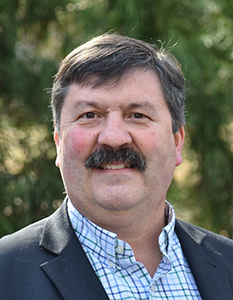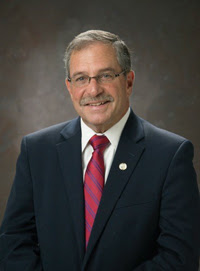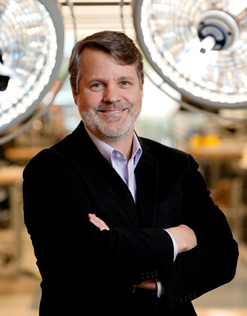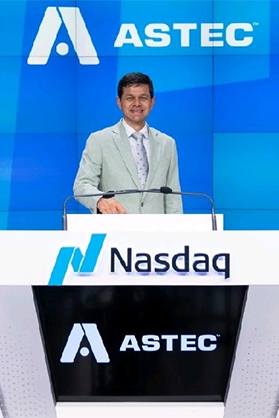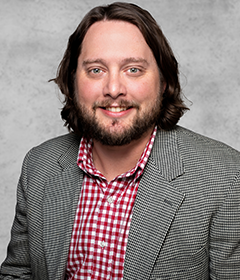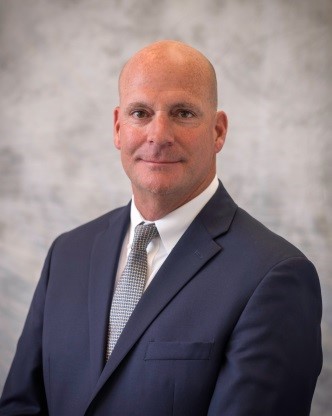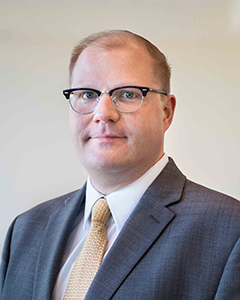Speaker Series
In support of our teaching, research, and service missions, the College continues the Speaker Series. As a further outreach commitment to students, faculty, and the extended community, the Speaker Series is open to the public. The presentations in the Speaker Series provide opportunities for sharing both cutting-edge information from noted researcher in various fields as well as experience and timely insights from community leaders.
For more information, contact the Dean's Office at 423-425-2256.
Warren D. Ladbrook
Thursday, September 19, 2024
3:00 p.m. - 4:00 p.m. ~ Maytag Room
ECS 426
Topic: Keys to career advancement and success (how to earn $1M more)
Bio:
Mr. Warren Ladbrook has directed the planning, engineering, and construction of many large, complex international and inter-agency infrastructure projects, including large post-disaster recovery programs. Mr. Ladbrook is astute in the diplomacy required in challenging situations and is skilled in the process of reconciling contrasting requirements. He can effectively and respectfully conduct the orchestration of elegant solutions from apparent chaos. Mr. Ladbrook is a widely skilled engineer who is now the Senior Director, Project Management at WithersRavenel, an employee-owned company based in NC. He graduated from UTC in 1993, and has served on the Civil Engineering Advisory Board at UTC for many years.
Chip Baker
President, Baker Associates
March 7 - 3:30pm - 4:30pm - Maytag Room
Topic: “A Dialogue Surrounding the Intersection of Healthcare and Engineering”
BiographyChip Baker received his Masters of Health Services Administration from the George Washington University, Washington, D.C., and embarked on a thirty-seven year career in healthcare administration. His post as vice-president of Erlanger Health System saw him responsible for the operation of Children’s Hospital, over 30 programs in the Erlanger Community Partnership, the Baroness Erlanger Foundation, the Children’s Hospital Foundation, the Craniofacial Program, and the Auxiliary. Mr. Baker is now president of Crestcom International, trusted leadership training partner for firms ranging from small and medium-sized business to Fortune 500 enterprises. His leadership development training programs are both accredited and award winning. He takes a proven approach to develop results-driven leadership competencies in management teams worldwide.
Michael Miga
Harvie Branscomb Professor, Professor of Biomedical Engineering* Vanderbilt University
* also appointed in Radiology, Neurosurgery, and Otolaryngology
March 21 - 3:15pm - 4:15pm - Maytag Room
Topic: “Computation-Enhanced Surgery and Intervention: Provocative Questions”
Biography
While modern medical imaging coupled to contemporary image processing and informatics has allowed for dramatic expansions of diagnostic information, similar advances in procedural medicine have lagged due to systematic barriers associated with conventional practice and clinical translational research. This reality motivates many questions, both exhilarating and yet sometimes provocative. The assertion in this talk is that treatment platform technologies of the future will need to be intentionally designed for the dual purpose of treatment and discovery. While it is difficult to be prescient on the forms that these forward-thinking systems will take in precision medicine, it is clear that new requirements associated with data integration/acquisition, automation, real-time computation, and cost will likely be critical factors. Exemplar surgical and interventional technologies will be discussed that involve complex biophysical models, methods of automation and procedural field surveillance, efforts toward data-driven procedures and therapy forecasting, and approaches integrating disease phenotypic biomarkers. The common thread to the work is the use of computational models driven by sparse procedural data to enable guidance and therapy delivery. Finally, the talk concludes by discussing operating rooms and interventional suites as places of investigation and the impact of clinical immersion in engineering training paradigms.
Michael I. Miga, Ph.D. received his Ph.D. from Dartmouth College specializing in biomedical engineering. He joined the faculty in the Department of Biomedical Engineering at Vanderbilt University in 2001 and is the Harvie Branscomb Professor at Vanderbilt. He is a Professor of Biomedical Engineering, Radiology and Radiological Sciences, Neurological Surgery, and Otolaryngology – Head and Neck Surgery. He is director of the Biomedical Modeling Laboratory (www.migalab.org) , and co-founder of the Vanderbilt Institute for Surgery and Engineering (VISE, www.vanderbilt.edu/vise). He has been PI on several NIH grants concerned with image-guided brain, liver, kidney, and breast surgery. He is PI and Director of a novel NIH T32 training program entitled, ‘Training Program for Innovative Engineering Research in Surgery and Intervention’ that is focused on the creation of translational technologies for treatment and discovery in surgery and intervention. He is also Director of the Master of Engineering in Surgery and Intervention program which is a professional engineering program focused at enhancing engineering skill sets and providing clinical immersion experiences for enabling graduates to work on cutting-edge technologies at the interface of engineering, surgery, and intervention. He also was a co-inventor of the first FDA cleared image guided liver surgery system. Dr. Miga is an AIMBE and SPIE Fellow and has served as a charter member of the Biomedical Imaging Technology (BMIT-B) and the Bioengineering, Technology, and Surgical Sciences (BTSS) Study Sections at NIH. His research interests are in computational modeling, inverse problems/computational imaging, soft-tissue biomechanics/biotransport, technology-guided therapy, image/imaging-guided surgery and intervention, and data-driven procedural medicine.
Sid Verma
Chief Technology Officer & President - Digital and Innovation - ASTEC
February 16th - 3:15pm - 4:15pm - Maytag Room
Topic: “Construction industry technology needs, challenges, and opportunities”
Biography
Specializing in the Manufacturing/ Industrial Products, Automotive/ Aerospace, Oil/ Gas, Metals/ Mining and Insurance industry, Sid Verma brings in more than 20 years of strategic problem solving acumen, advising C-Suite/ Boards and managing Product & Services business in IoT, Cyber, Cloud and AI. Sid has a proven track record of managing multi-$M P&L, leading large global teams, and incubating / exponentially growing digital business both organically & via M&A in large industrial and services companies. See his LinkedIn profile for further background information.
Gregory Sechrist
Associate Technology Manager at University of Tennessee Research Foundation
November 8th - 3:15pm - 4:15pm - Maytag Room
Topic: “Positioning Your Technology for Impact: How IP Can Establish A Market Advantage”
Description
Innovations developed at a university are often at an early stage and require a commercial partner to reach their full potential. By utilizing different forms of intellectual property (IP), university researchers can better position their technologies for industry adoption and societal impact.
Biography
Gregory Sechrist is an associate technology manager in the Knoxville office, where he works to commercialize technologies developed by inventors from the College of Engineering at the University of Tennessee Knoxville, the University of Tennessee Chattanooga, and the University of Tennessee Space Institute. Gregory holds a BS in Mechanical Engineering from Clemson University and a JD from the University of Mississippi.
Tim Rausch
Chief Nuclear Officer - TVA
September 15th - 3:15pm - 4:15pm - Maytag Room
Topic: “So you want to put your education to work?”
Biography
Tim Rausch, chief nuclear officer, leads TVA’s robust nuclear organization, and is responsible for oversight of seven reactors at three nuclear sites: Watts Bar, Sequoyah and Browns Ferry, which together generate enough carbon-free power for more than 4.5 million Tennessee Valley homes and businesses. TVA operates the third largest nuclear fleet in the nation.
Rausch has more than 30 years in commercial nuclear operations. His background includes leadership roles in operations, maintenance, engineering, training, quality, process re-engineering and project management.
Drawing from all of his experience, he is intensely focused on improving overall operational performance of the TVA fleet so that it ranks in the top quartile in the nation by the end of 2022,
Rausch has helped implement a practical “learn, prepare, execute” culture of continuous improvement for the TVA Nuclear Fleet and is focused on further strengthening TVA’s nuclear safety culture. Furthermore, by leveraging the power of the TVA Nuclear team, he has inspired a collaborative work environment focused on accountability and ownership across all levels of the organization. This is showcased through the deployment of three key focus areas that promote the power of “We”: We Work Safely, We Execute Flawlessly and We Operate Reliably.
Under his leadership, TVA completed a multi-year, 465 megawatt uprate on the three units at Browns Ferry Nuclear Plant. This uprate provides enough additional generation to power 280,000 homes from the current plant footprint.
Prior to joining TVA, Rausch served as senior vice president and chief nuclear officer at Susquehanna nuclear plant from 2009, first with PPL Corporation and subsequently with Talen Energy, until accepting the chief nuclear officer position with TVA. At Susquehanna he led the team that developed and executed a business plan to reduce costs by over 25 percent while producing best-ever safety, reliability and generation results in 2017. He had responsibility for corporate executive leadership implementing governance, oversight and support for safe, reliable and cost-effective nuclear company performance.
Additionally, Rausch served as site vice president of Exelon Nuclear Corporation’s Oyster Creek Nuclear Generating Station and plant general manager at First Energy’s Perry Nuclear Plant, where he advanced through positions of increasing responsibility.
Rausch has a senior reactor operator certificate on a Boiling Water Reactor-2 and a Boiling Water Reactor-6. He received an MBA from Cleveland State University and earned a B.S. in Nuclear Engineering from the University of Cincinnati. He supports careers for the next generation in the nuclear industry by serving on the University of Tennessee-Chattanooga College of Engineering advisory board.
In case you missed it, here is the video for Tim Rausch's Talk.
Dr. Nick Peters
Section Head - Quantum Information Science Section
April 6th - 2:00pm - 3:00pm - Maytag Room
Topic: “Quantum Communications and Networking at Oak Ridge National Laboratory”
Quantum networks are needed to harness the full promise of quantum devices. In this talk, we’ll introduce key concepts, devices, and systems for building quantum networks. We’ll describe how and why quantum key distribution is a great fit for energy infrastructure cybersecurity. We will tie these themes to recent ORNL research.
Biography
Nicholas A. Peters the Section Head for Quantum Information Science (QIS) at Oak Ridge National Laboratory (ORNL), where he manages more than 30 research staff and oversees a budget of more than $10 million. Under Peters’ direction ORNL has made significant contributions to quantum networking and computing, as well as the use of quantum information for enhanced cybersecurity. After completing his doctoral thesis on photonic entanglement from The University of Illinois Urbana-Champaign in 2006, Peters worked at Telcordia Technologies/Applied Communications Sciences in the Broadband Optical Networking Department for roughly a decade before joining ORNL in 2015. At ORNL, he has held progressive leadership roles including Team Lead and Group Leader while growing ORNL's QIS effort and founding the laboratory’s QIS section. Peters’ research has a wide array of applications and as such has been funded by the Department of Energy's (DOE's) Office of Science (Advanced Scientific Computing Research and High Energy Physics programs), DOE's Office of Cybersecurity, Energy Security and Emergency Response, DOE's Office of Electricity, The Defense Advanced Research Projects Agency, The Defense Threat Reduction Agency, The Office of Naval Research, and The Intelligence Advanced Research Projects Activity. He is co-inventor of 14 US Patents, garnering three licenses, and has coauthored more than 100 scholarly publications. He won a Thomas Alva Edison Patent Award in 2012, an R&D100 award in 2021, and multiple corporate-level awards, and is a Member of The American Physical Society (APS), a Senior Member of Optica (formerly OSA) and a Senior Member of the Institute of Electrical and Electronics Engineers (IEEE). Peters is an active referee and was recognized as an APS Outstanding Referee in 2022 (a lifetime achievement award). He has served as an Associate Editor for Optics Express since 2016.
